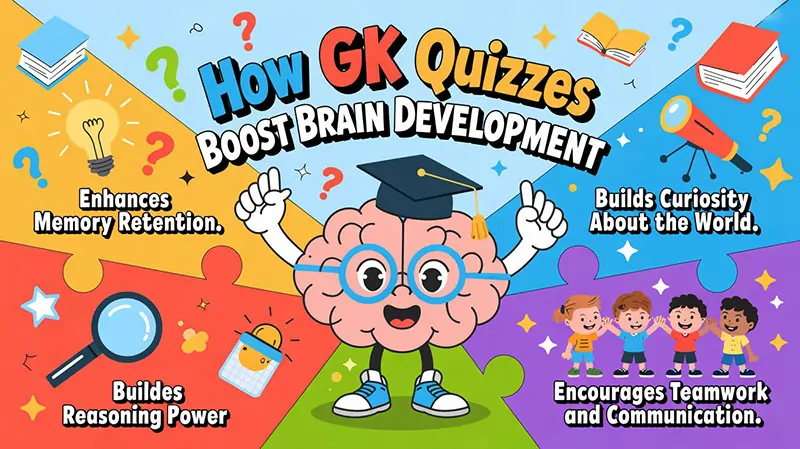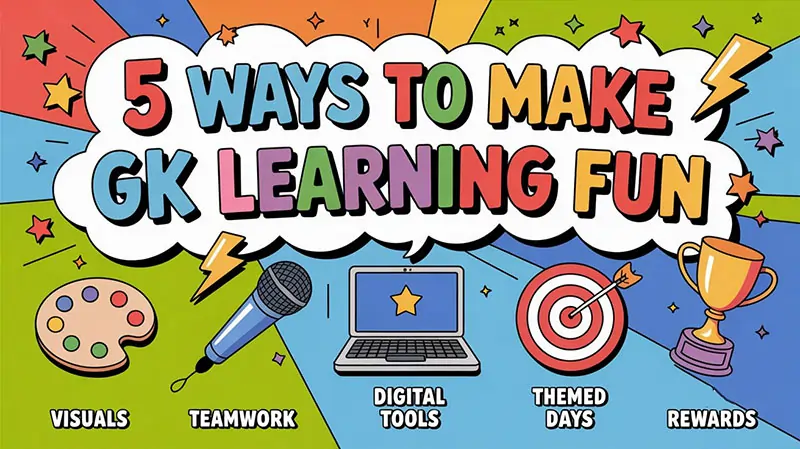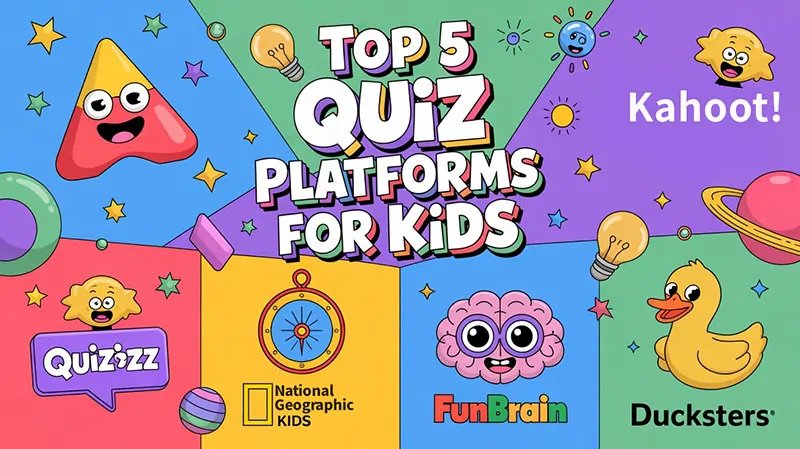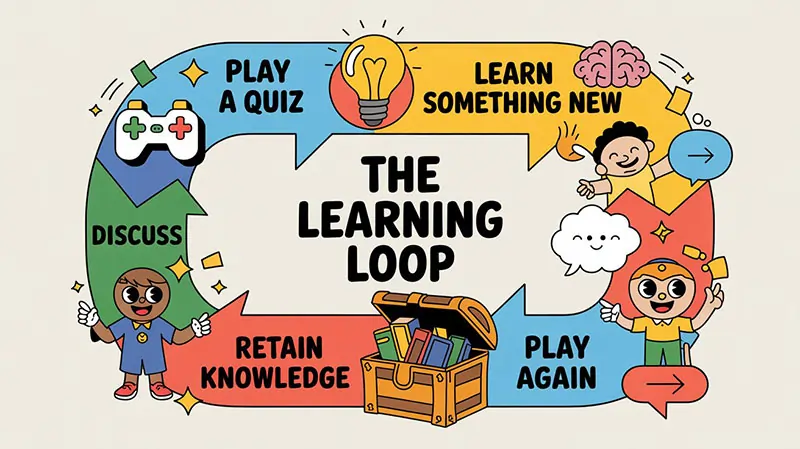Increase Your Intelligence: Fun GK Test for Children with Solutions
Last week, my kid spent twenty minutes straight reciting space-related facts when she got home. Why? She had recently dominated a quiz competition with her peers. That radiance in her face? I became addicted to kid-friendly quiz games because of this.
See, our kids can Google anything in a matter of seconds. But will they be able to put what they learn into practice? The true question is that. Frequent quizzing helps youngsters learn how to think quickly, retain information, and—best of all—not be afraid to voice their opinions when they’re not sure.
1. What Is A General Knowledge Quiz and Why Should Kids Take One?
Ignore tedious testing. GK quizzes are similar to brain gymnastics, but they’re much more enjoyable and your child isn’t being forced to take them. This is what occurs: You ask questions about space, technology, nations, animals, and pretty much anything else. Children scramble to respond. Their minds awaken. They begin to notice previously unnoticed connections. With today’s science chapter, yesterday’s history lesson suddenly made sense. One time, while we were watching a movie, my son asked me why volcanoes occur. He had responded to a tectonic plate quiz question two weeks prior. You see? When information is presented through games, it is more memorable.
- improves the ability to remember things
- increases the capacity for reasoning
- stimulates communication and teamwork and increases curiosity about the world.

2. The Benefits of Improving General Awareness Early On
Giving children quizzes at a young age? The best choice you’ll ever make. This is why it’s important: The bottom line? Regular quizzes help kids accomplish more than just memorize facts. They acquire the ability to learn. That ability? It will support them through their careers, education, and everything else.
| Benefit | How It Helps | Example |
| Cognitive Growth | Improves focus, reasoning, and problem-solving | Solving picture-based quiz questions |
| Confidence Building | Boosts public speaking and self-esteem | Classroom quiz competitions |
| Curiosity & Exploration | Encourages learning beyond textbooks | Asking “Why” and “How” about the world |
| Academic Support | Enhances performance in school subjects | History and science quiz rounds |
| Social Interaction | Promotes teamwork and collaboration | Group quiz sessions |
3. Fun GK Age-Specific Quiz
Have some fun with it! Here is a list of general knowledge quiz questions organized according to age, designed to test and entertain children of varying levels of education.
? For Ages 5–7 (Beginners)
| Question | Answer |
| What color is the sky on a clear day? | Blue |
| How many legs does a spider have? | Eight |
| What do we call the baby of a cat? | Kitten |
| Which planet do we live on? | Earth |
| What is the opposite of “hot”? | Cold |
These are ideal for quizzes around the kitchen table. Don’t be too heavy. Make amusing noises. Allow them to be foolish by giving incorrect answers.
? For Ages 8–10 (Intermediate)
| Question | Answer |
| Who is known as the “Father of Our Nation” in India? | Mahatma Gandhi |
| How many continents are there in the world? | Seven |
| What gas do plants release during photosynthesis? | Oxygen |
| Which is the largest ocean on Earth? | Pacific Ocean |
| What is the capital of Japan? | Tokyo |
This age group enjoys flaunting themselves. Let them express their knowledge of the solution. Real learning takes place there.
? For Ages 11–13 (Advanced)
| Question | Answer |
| Who wrote the national anthem of India? | Rabindranath Tagore |
| What is the hardest natural substance on Earth? | Diamond |
| Which planet is known as the Red Planet? | Mars |
| Who discovered gravity? | Sir Isaac Newton |
| Which country is known as the “Land of the Rising Sun”? | Japan |
This age group enjoys flaunting themselves. Let them express their knowledge of the solution. Real learning takes place there.
4. General Knowledge Test with Answers in Printable Form
A screen is not necessary for everything. Give out pencils, print these questions, and watch as children truly concentrate without having their phones vibrating every five seconds. Ideal for rainy Sundays when everyone is bored or for birthday celebrations when you need 20 minutes of peace and quiet.
? Sample Printable Quiz: “Brain Boost Challenge”
| No. | Question | Answer |
| 1 | What is the largest mammal on Earth? | Blue Whale |
| 2 | How many colors are there in a rainbow? | Seven |
| 3 | Who was the first man to step on the moon? | Neil Armstrong |
| 4 | Which festival is known as the Festival of Lights? | Diwali |
| 5 | What is the national animal of India? | Tiger |
| 6 | How many players are there in a cricket team? | Eleven |
| 7 | What is the capital of France? | Paris |
| 8 | Which is the smallest planet in our solar system? | Mercury |
| 9 | Who painted the Mona Lisa? | Leonardo da Vinci |
| 10 | What is the boiling point of water? | 100°C |
5. The Ways in Which Quizzes Can Enable Learning to Be More Interactive
Typical Q&A quickly becomes tedious. Add some spice. This is what genuinely works:
? Days of Quiz with a Theme
I completed “Dinosaurs vs. Space” last month; half of the questions were on ancient animals, and the other half were about planets. Children arrived dressed as characters. Since it felt more like a party than homework, even the more reserved ones joined in. Quizzes become events with themes. Choose “Ocean Week,” “Famous Inventors,” or “Around the World” and go for it.
? The Use of Visual Aids
Don’t just tell; show. Show a photo of the Taj Mahal and inquire on its location. Show a flag and inquire about the nation. For younger children, visuals simplify questions, but for older children, they add interest. Prior to utilizing Google Images for quizzes, my friend’s child struggled to recall European capitals. She’s invincible now.
? Team Contests
Divide into groups. Name the squad (let the youngsters select; half the fun will be in their goofy choices). Suddenly, being the brightest person isn’t important. The goal is to assist your team in winning. Teamwork makes shy youngsters flourish. To teammates, they will murmur responses that they would never utter on their own.
? Quiz Games Online
My life was revolutionized by Kahoot!. Really. Children are captivated when they see that vibrant screen, hear the countdown, and see their name rise up the scoreboard. Another good one is Quizizz. They’re both free. Be advised that they will plead for “just one more game.” You will be quizzing till midnight if you don’t set time limits in advance.
? Offer Rewards for Learning
Stickers are effective for young children. Older ones can use the certificates. Sometimes the mere announcement that “Emma got five in a row!” is sufficient compensation. Avoid going too far. A quick high five is preferable to a costly reward. Children recall the achievement rather than the present.

6. Suggestions for Parents and Instructors
In order to foster the acquisition of general knowledge, parents and teachers play an important role. We have a few suggestions that can be put into action to make it more efficient and enjoyable:
? For Parents
- During dull moments, pose arbitrary inquiries. Are you stuck in traffic? “How many bones in the human body?” “Name three types of clouds.” Are you waiting for food?
- Be informal. No stress, no grades, and no pressure. Incorrect responses spark conversations rather than disappointment.
- Take a quick three-question test before bed. Together, they beat scrolling phones.
? For Teachers
- Each class begins with a single quiz question. more quickly captures their interest than “settle down everyone.”
- Weekly quiz contests are less effective than monthly ones. allows children to get ready without feeling rushed.
- Link quizzes to the lessons being taught. Are you a World War II student? Inquire. Are you reading about Einstein? Test their knowledge of scientists.
? Combined Tip
To celebrate participation rather than perfection, both parents and teachers should do so. Acquiring a curious mind is more important than simply having the correct answers.
| Activity | Who Can Do It? | Impact on Kids |
| Daily trivia time | Parents | Builds curiosity |
| Weekly quiz session | Teachers | Encourages consistency |
| Themed competitions | Both | Promotes teamwork |
| Reward systems | Both | Boosts motivation |
7. GK Quizzes: Frequently Asked Questions
1. What is a children’s general knowledge test?
A: It raises issues pertaining to history, science, sports, animals, and nations. But not the dull textbook questions—fun ones. Think game show rather than test.
2. When are general knowledge tests appropriate for kids?
A: The sweet spot is once or twice a week. More seems like homework. Less, and they lose the knowledge they acquired.
3. Is it preferable for students to take quizzes in person or online?
A: Combine the two. For thrills and immediate scores, go online. Offline for discussions and clarifications. They have different functions, thus neither is superior.
4. How can I prepare my kids for competitions using general knowledge?
A: Don’t treat it like preparation. Simply incorporate learning into your daily routine. Together, watch documentaries. Read aloud from fascinating articles. At supper, talk about random facts. When curiosity is continuous, preparation comes easily.
5. Which online resources provide the best general knowledge tests?
A: FunBrain, Quizizz, Kahoot! and KidsWorldFun are at the top of my list. All of them are age-appropriate, free, and genuinely fun for children.

8. The Conclusion, Along with Links to Additional Tests
When I proposed a quiz game to my kids three months ago, they moaned. They invited local children and threw one themselves last weekend. That change? Quizzes became enjoyable rather than mandatory, which is why it happened. Begin modestly. Today, ask one inquiry. Make it humorous or engaging, but just make it happen. Ask another tomorrow. Before you realize it, your child isn’t merely browsing through the world; they are actually interested in it. Although they are not magic, quizzes are rather similar. They transform passive education into active engagement. “I don’t care” is changed to “I want to know more.” Are you prepared to begin? This is where you can go, next.
| Website/Platform | Description | Link |
| Kahoot! | Interactive quizzes for classrooms and families | kahoot.com |
| Quizizz | Fun multiplayer learning games | quizizz.com |
| National Geographic Kids | Geography and nature-based quizzes | kids.nationalgeographic.com |
| FunBrain | Educational trivia and puzzles | funbrain.com |
| Britannica Kids | Verified general knowledge quizzes | kids.britannica.com |




